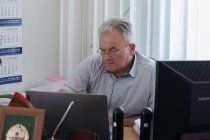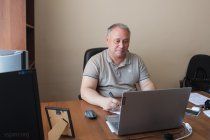 Русский
Русский English
English-







Residency instead of internship
Graduates of the Faculty of Medicine of the Pridnestrovian State University will take residency instead of internship. This c allows being involved in the medical specialty in practice. The legislative initiative, transforming the system of postgraduate medical education, belongs to the PMR President.
Graduates could become doctors after completing their internship – a year of practice in medical institutions until now. Residency training in Pridnestrovie has not been used before. It involves a more in-depth study of the chosen specialty with a focus on practice. The young doctor will work under the supervision of experienced doctors for two years. Both current graduates of the Faculty of Medicine and those who previously received a diploma in higher medical or pharmaceutical education will be able to master the residency programs. Training has been conducted only in residency in Russia since 2017, the internship was canceled in 2016.
Chairman of the Committee on Education, Public Associations and the Media Igor Buga told the press service of the Supreme Council in more detail about how this mechanism will work.
Igor Buga added: the main issues have been thought out, the system will work and will provide an opportunity to move to a qualitatively new level of training for Pridnestrovian medical specialists.
President Vadim Krasnoselsky held several working meetings with representatives of the Ministry of Health and the Pridnestrovian State University at the stage of preparing the law-in-draft for consideration in the Supreme Council. It was discussed that, first of all, the residency will take place on the basis of state medical institutions. The state university will be responsible for the distribution of graduates. Residents will be assigned to payroll jobs at the hospital or clinic where they will be trained. They also talked about cooperation with Russian universities. There is already an agreement with the Volga Medical Faculty. Russian specialists are ready to assist in the training of Pridnestrovian residents.
The Supreme Council supported the initiative of the President in the second final reading and adopted amendments to several laws at once: "On education", "On higher and postgraduate vocational education", "On the basics of public health protection" and "On wages of public sector employees, monetary allowance servicemen and persons equated to them in terms of payment of wages, pay for civil servants".




